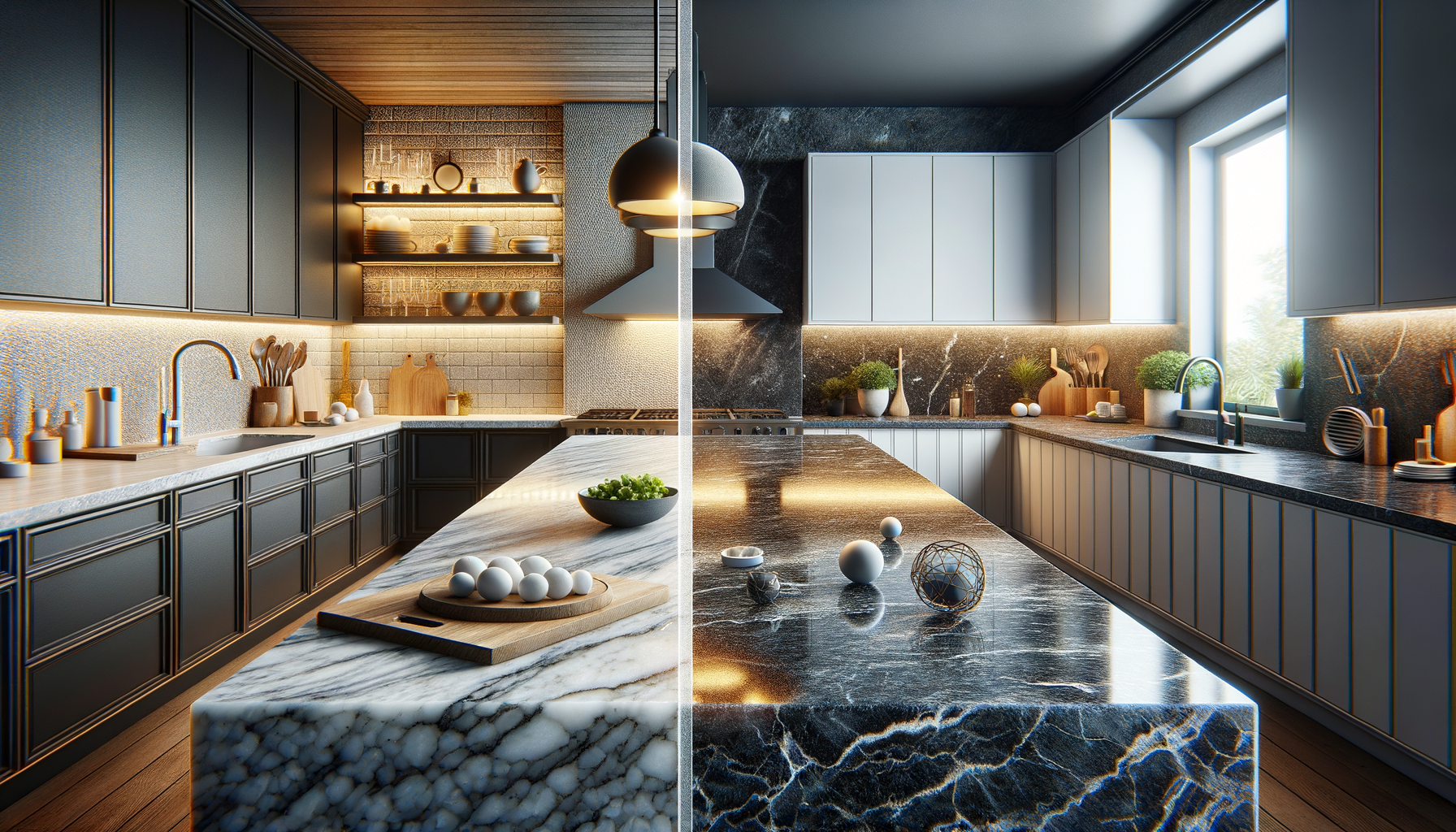Understanding Quartz Countertops
Quartz countertops are engineered stone surfaces, composed of approximately 90% ground quartz combined with resins, polymers, and pigments. This blend creates a hard, durable surface that is both aesthetically pleasing and highly functional for kitchen use. Unlike natural stone options, quartz countertops are non-porous, meaning they resist staining and do not require regular sealing. This makes them a practical choice for busy households looking for low-maintenance solutions.
One of the standout features of quartz countertops is their versatility in design. They can mimic the appearance of natural stone, such as marble or granite, while offering a wider array of color options and patterns. This flexibility allows homeowners to tailor their kitchen aesthetics without compromising on performance. Additionally, the manufacturing process of quartz countertops ensures consistency in color and pattern, which is often a challenge with natural stone.
Quartz countertops are also known for their durability. They are resistant to scratches and chips, making them suitable for high-traffic areas like kitchens. This resilience, combined with their non-porous nature, means they are less likely to harbor bacteria, contributing to a healthier kitchen environment. Overall, quartz countertops offer a blend of beauty, durability, and hygiene that is hard to match.
Granite vs. Quartz: A Comparative Analysis
The debate between granite and quartz countertops is a common one among homeowners looking to upgrade their kitchens. Granite is a natural stone, known for its unique patterns and natural beauty. Each slab of granite is distinct, which can be a selling point for those seeking a one-of-a-kind look. However, this uniqueness can also pose challenges in terms of matching slabs for larger installations.
In contrast, quartz countertops, being engineered, offer uniformity in appearance. This can be an advantage for achieving a cohesive look across the kitchen. Furthermore, granite is porous and requires regular sealing to prevent stains and bacteria growth, whereas quartz’s non-porous nature eliminates this need, offering a more low-maintenance option.
When it comes to durability, both materials are strong, but quartz has a slight edge due to its engineered composition. Granite can chip or crack under heavy impact, while quartz is more resilient to such damage. Additionally, quartz countertops are more resistant to acidic spills, which can etch the surface of granite if not cleaned promptly.
In terms of cost, both materials can vary widely depending on the quality and rarity of the stone or design. However, quartz tends to be more consistent in pricing, while granite can range significantly based on the uniqueness of the slab. Ultimately, the choice between granite and quartz will depend on personal preferences regarding maintenance, aesthetics, and budget.
The Benefits of Quartz Countertops
Quartz countertops offer several advantages that make them a popular choice for modern kitchens. One of the primary benefits is their low maintenance. Unlike natural stone, quartz does not require sealing, polishing, or special cleaning products. This ease of care makes it an attractive option for homeowners who prefer a hassle-free kitchen.
Another significant benefit is the material’s durability. Quartz is one of the hardest minerals on earth, and when combined with resins and polymers, it creates a surface that is resistant to scratches, chips, and stains. This durability ensures that quartz countertops maintain their appearance and functionality over time, even in busy kitchens.
Quartz countertops also offer a wide range of design possibilities. With numerous colors, patterns, and finishes available, homeowners can find a quartz countertop that perfectly matches their kitchen style. Whether you prefer the look of natural stone or a more modern, sleek appearance, quartz provides the flexibility to achieve your desired aesthetic.
Furthermore, quartz countertops contribute to a healthier kitchen environment. Their non-porous surface resists bacteria and mold growth, making them a hygienic choice for food preparation areas. This quality is particularly important for families with young children or those who prioritize cleanliness in their homes.
Overall, the combination of low maintenance, durability, design flexibility, and hygiene makes quartz countertops a compelling option for any kitchen renovation.
Design Flexibility with Quartz
One of the standout features of quartz countertops is their design flexibility. Unlike natural stone, which is limited by the colors and patterns found in nature, quartz can be engineered to meet specific aesthetic preferences. This means homeowners have access to a broader palette of colors, ranging from vibrant hues to subtle, earthy tones.
Quartz can mimic the appearance of other materials, such as marble or granite, allowing homeowners to achieve the look of these natural stones without their associated maintenance concerns. Additionally, quartz offers a variety of finishes, including polished, honed, and textured surfaces, enabling further customization of the kitchen’s look and feel.
For those looking to incorporate unique design elements, quartz can be paired with other materials, such as wood or metal, to create contrasting textures and visual interest. This versatility makes quartz an excellent choice for both contemporary and traditional kitchen designs.
Moreover, quartz countertops can be manufactured to include integrated features, such as sinks or drainboards, offering seamless functionality and a streamlined appearance. This integration can enhance the kitchen’s overall design while providing practical benefits for everyday use.
In summary, the design flexibility of quartz countertops allows homeowners to create personalized kitchen spaces that reflect their style and meet their functional needs. Whether you’re aiming for a classic, timeless look or a bold, modern statement, quartz provides the options needed to bring your vision to life.
Conclusion: Choosing the Right Countertop for Your Kitchen
When deciding between quartz and granite countertops, it’s essential to consider your priorities in terms of maintenance, durability, design, and budget. Quartz countertops offer a blend of low maintenance, exceptional durability, and design flexibility that appeals to many homeowners. Their non-porous nature and resistance to scratches and stains make them a practical choice for busy kitchens where ease of care is a priority.
While granite offers the allure of natural stone with its unique patterns, it requires more upkeep and may not provide the same level of durability as quartz. Ultimately, the choice between these two materials will depend on personal preferences and the specific needs of your kitchen.
As you contemplate a kitchen renovation or upgrade, consider the benefits that quartz countertops can bring to your space. With their combination of beauty, practicality, and versatility, they represent a wise investment for any modern kitchen.








